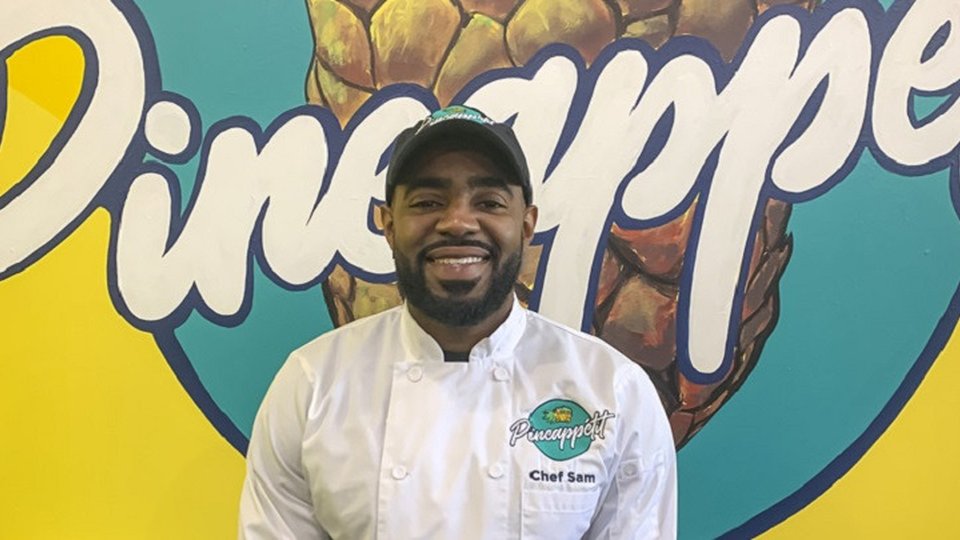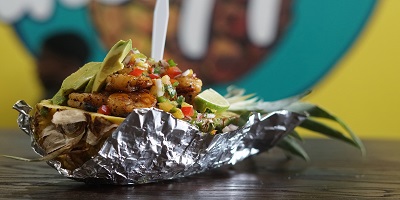Independent Operators
Food truck entrepreneur credits community support in brick-and-mortar quest
Chef Sam Burgess, owner of the Pineappetit food truck and a brick-and-mortar restaurant that just launched several week ago, hasn't let the pandemic get in the way of achieving his goals.

May 10, 2021 by Judy Mottl — Editor, RetailCustomerExperience.com & DigitalSignageToday.com
Being a food truck operator, and/or owning a restaurant has been a tough road since the spring of 2020 when the COVID-19 pandemic hit the U.S., shuttering thousands of businesses and prompting food truck entrepreneurs to scramble to reach a customer base that was essentially locked-down for the year.
One of the hardest hit segments of the food industry has been Black-owned businesses, with an H&R Block survey reporting 53% of Black business owners seeing revenue drop by half, compared to 37% of white business owners. In fact, according to the Federal Reserve Bank of New York, Black ownership dropped 41% in 2020 — the most significant decline among all racial groups during the pandemic months.
But Chef Sam Burgess, owner of the Pineappétit food truck in Tallahassee, Florida isn't among those statistics. He, in fact, is breaking way from the statistics in not only keeping his island cuisine food truck up and running but also opening his first brick-and-mortar restaurant in late April. (Fora detailed look at the food truck check out this spotlight feature). And he credits fellow Tallahassee food truck owners and the local businesses community for his business survival, success and growth.
How Pineappétit came about
Burgess' love of cooking started well before he was in his teens. He recalls helping his parents in the kitchen when he was 10, and said cooking was truly a love affair within the family.
"Everyone in my family loves to cook including my mom, dad, cousins, grandparents, everyone! I definitely learned a lot from helping out in the kitchen as a kid with my family," he told Food Truck Operator in an email interview.
During his high school and college years (he graduated from Florida Agricultural and Mechanical University with a sports management degree) he worked at over two dozen establishments, but found none fulfilling.
"I realized that I wasn't meant to be an employee. As a student studying sports management, I was relating each and every assignment to entrepreneurship. I wanted to have a business all along. It put me in the mindset that I can use my sports management classes to my advantage as an aspiring business owner and I decided to start my food truck right after graduating," he said.
 The truck menu came about after he discovered a photograph of food served in a pineapple bowl. And the name came about just as organically.
The truck menu came about after he discovered a photograph of food served in a pineapple bowl. And the name came about just as organically.
"I wanted to make sure to emphasize our unique way of using a pineapple as a bowl. I also love a good play on words so Pineappétit was perfect for my brand," he said..
He launched his food truck signature pineapple bowls in 2018 and he's not looked back since.
Business in a pandemic
Prior to the COVID-19 pandemic hitting the U.S. in 2020 Burgess was employing six workers.
But the pandemic dropped that staffing to two and while his commitment to his business didn't falter, he experienced a rough business road.
"This was definitely hard on me because I felt more alone and as if I didn't have any support. It felt like my business was taking steps backwards instead of forwards. Sales also went down because a lot of customers moved back home instead of staying at a college town," he said.
One bright spot was that the pandemic environment presented some unforeseen opportunities, such as media focus on Black-owned business.
"The support I received as a result definitely helped me make it through those difficult months," he said. "I am so grateful to have met individuals in my industry that support and guide me as I continue to expand my business."
Burgess mentioned two fellow food truck operators, those running the Smoothie Time and Big Easy Snowballs, in helping him stay focused and moving forward toward growth — specifically launching a physical restaurant location in April.
How the restaurant came about
Burgess wanted a brick-and-mortar location for one big reason: space.
"Running everything from a small truck is difficult as our customer-base becomes larger. A physical restaurant allows me to be open all day within the same location instead of attending three- to four-hour long events sporadically throughout the week," he said, adding that having both the truck and the restaurant allows him to attend events and have a reliable and consistent location.
"When I was thinking about opening my restaurant, I had to consider how much of a cost it would be. Operating a food truck is a much cheaper option and taking that leap of faith to expand my business was definitely a difficult decision," he said.
The restaurant, located at 2037 West Pensacola St., boasts about eight to 10 different items from those available from the food truck, including pasta, chicken wings and Caribbean patties. He does hope to launch them on the truck menu down the road.
His staff works on both the food truck and in the restaurant and he's now preparing all his menu in the restaurant.
During the restaurant's grand opening on April 22, Burgess donated a portion of the proceeds to the Golden Chance foundation, a local nonprofit dedicated to providing resources and scholarships to individuals affected by the premature death of a biological parent.
It's close to Burgess' heart as the owner of the nonprofit, Michael Jenkins, is his close friend who suffered the loss of both his parents at a young age.
While a food truck and a restaurant are more than enough work for most entrepreneurs it's not enough for Burgess. He's already looking ahead to advance his brand and cuisine footprint.
"I am most definitely looking to expand. I would love to open more brick-and-mortar sites in the future in different areas of the country and be known for my on-the-go island dishes," he said.







